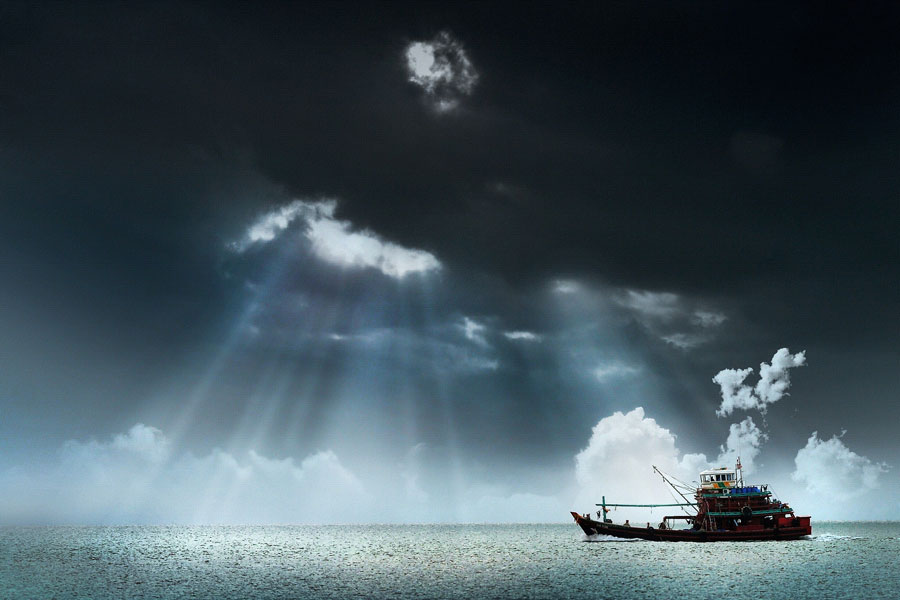Sustain • London Food Link • Articles
Radical ways to save our seas
Should we pay our fishermen to stop fishing? Would a ban on selling red-rated fish save marine species from extinction? Tania Han floats some radical ideas for a sustainable fish future.

How sustainable is the fish you eat? Shockingly, even after years of campaigns and inspiring TV wildlife series, endangered fish are still appearing in restaurants and on sale in shops, and many of the world’s fish stocks are in trouble. If we want to save our seas are small steps good enough or do we need a radically new way of thinking and eating?
In the UK, we consume £5.7 billion worth of fish and seafood every year. The future of this delicious source of protein and healthy oils looks pretty bleak, if we don’t take radical action to secure our fish stocks for the future. The United Nations Food and Agriculture Organisation calculates that nearly a third of global fish stocks are now overfished, and over 60% are fished to their natural limit. On top of this, the UN estimates that one fifth of the global catch is illegal and unregulated.
And while farmed fish is an option, it’s important to make sure it’s sustainably reared and certified, to minimise pollution and support better employment conditions.
‘The market for sustainable seafood is growing up to 10 times faster than conventional seafood’
Fishy Business
An investigation by Sustainable Fish Cities in 2018 found that the British fishing industry is losing out on markets worth an estimated £62 million. The reason for this is that UK fisheries are not all managed sustainably, or lack the data and certification to prove their sustainability status. This means retailers and foodservice companies with ethical fish buying policies have to go overseas to buy verifiable sustainable fish.
Yet fishing holds great potential to create jobs and food security. The Natural Capital Committee noted that the market for sustainable seafood is growing up to 10 times faster than conventional seafood. Improving the sustainability of British fisheries would mean that the UK could catch an additional £1.4bn worth of fish if all stocks recovered.
So how do we get from here to there? Here are three radical ideas worth considering.
1. Give fisherfolk a five-year holiday
The New Economics Foundation in their No Catch Investment report, calculated that if fishing was halted completely, most UK fish populations could be restored in just five years. Even if taxpayers paid fishers compensation for loss of income and extended this timeline to 10 years, NEF suggests that our economy, fish stocks and fishing livelihoods would be better off in a comparatively short amount of time. In farming, this is known as ‘public money for public goods’, and £3 billion has been allocated for farmers for these projects post-Brexit. Currently there is no such provision for Fishing. Why ever not?
‘Most UK fish populations could be restored in just five years’
2. Ban the sale of endangered fish
This has both ecological and symbolic value. Banning the sale of fish which is red-rated by the Marine Conservation Society (see mcsuk.org/goodfishguide) would see some sources of cod, wild seabass, ray, skate, wild halibut, scallop, scampi, shark, sturgeon, whiting and whitebait off the menu – but a dramatic drop in demand for these species would surely deliver an overdue jolt into action?
3. Make sustainable fish buying a legal requirement
The Sustainable Fish Cities campaign has now secured commitments to buy only verifiably sustainable fish from catering companies that serve well over 800 million meals per year. Good progress, yet not good enough. These pioneers have shown it’s possible, but not every food business is a pioneer. Let’s look upstream and simply make it a legal requirement to serve only sustainable fish. The handful of wholesalers would soon shape up and make sure that all of the fish they supply has squeaky clean sustainability credentials.
FISH SUPPER
Radical solutions won’t happen overnight. So in the meantime, you can do your bit by looking for the Marine Stewardship Council (MSC) ecolabel, showing that wild-caught seafood is from a certified sustainable source, or choose a brand that is upfront about the their sourcing policy. For farmed fish, look for the Aquaculture Stewardship Council ecolabel or the organic label. RSPCA Assured, Global Aquaculture Alliance and Global GAP are also good options. If it’s not obvious, start a conversation where you shop and eat, and ask them to remove endangered species from their menus or shelves.
Visit www.fishonline.org to find out which fish to eat and which to avoid. And become a Sustainable Fish Champion by joining our Sustainable Fish Cities campaign.
www.fishcities.net
@FishCities
Published Monday 30 September 2019
London Food Link: London Food Link brings together community food enterprises and projects that are working to make good food accessible to everyone in London to help create a healthy, sustainable and ethical food system for all.